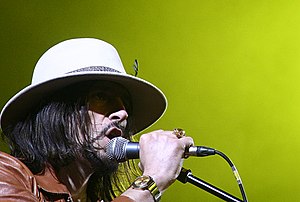The Future Sound of London
The future sound of London will be the audible background noise that can be heard in the city of London, England in the future. It is as of yet unknown exactly what point in the future this will be at.
While the official consensus among the scientific community is that there is no way to know what the future sound of London will sound like, there exist two men from Britain, Garry Cobain and Brian Dougans, who claim to have heard it, or at least what it will be at a certain point in the late 21st century.
The alleged time travellers[edit | edit source]
The men who have supposedly heard the future sound of London are Garry Cobain, lost brother of American rock musician Kurt Cobain, and Brian Dougans, a humanoid robot who abandoned his job stacking crates at a local factory to pursue a career in acid techno music.
The two men first gained notoriety in 1991 when they were discovered wandering in a confused state around the rainforests of Papua New Guinea. They told the local authorities of the existence of a portal somewhere in the nearby area that they had entered, and claimed it transported them to London in the far future, "around the year 2097", according to Cobain. They said that they found themselves in a world full of strange, alien-like sounds, which, to quote Dougans "sounded a bit like '90s techno music". They had with them a tape onto which they claimed to have recorded some of the sounds. The two were met with scepticism, but they would go on to release the recorded sounds as an album titled "Accelerator". The album was controversial; shunned by politicians, scientists, and the general public alike, most of whom believed the whole story to be a load of rubbish. Nevertheless, it was an underground success, and became quite popular at raves.
They allegedly returned to the future in the year 1994. This time, they said they found themselves in a London filled with eggshells, flowers, pigs, and other mysterious creatures. This resulted in a second album, "Lifeforms". In contrast to their first LP, this one had more of an ambient style. They were again met with intense scepticism in the public eye, but the music was reviewed favourably by contemporary critics. The club scene, however, reacted with hostility to the album, who found the more experimental nature of the album difficult to dance to. The band Orbital infamously included a four-minute recording of pedestrian crossing lights as a B-side to their 1994 single "Are We Here?", entitled "The Actual Future Sound of London, Not that Pseudo-intellectual Crap by Garry and Brian".
Their final supposed travel to the future was in 1996. The resulting album, "Dead Cities" was a return of sorts to the more danceable nature of their first release, and they somewhat managed to redeem their reputation amongst clubgoers. Their popularity was further aided when the single "We Have Explosive" was covered by the Surfaris, an American rock band who wrote the famous song "Wipe Out" in the 1960s.
Later years[edit | edit source]
Cobain and Dougans never travelled to Papua New Guinea again after 1996, and the public soon began to forget of their existence. They dabbled in psychedelic rock for some time under the alias of "Shapeless Genderless Blob", resulting in a few hit-or-miss albums. In 2007 they decided to return to their future sound of London roots, releasing the "Environments" album, the first in a lengthy series of releases recorded entirely from scratch, but in the style of their old albums. As they were not the true sounds of London in the future, they proved to be unpopular with audiences.
Nowadays, they are virtually unknown to the public. Many of the critics, sceptics, and politicians who were around when they were popular in the '90s have either forgotten about them, moved on, or died. Only the die-hard fans of theirs remember them, many of which have since come to regard the duo with nothing more than distrust, wondering why they ever believed that Cobain and Dougans had ever travelled to the future in the first place. But there are still those that truly believe that in the '90s, those two men from England found a portal to London a century into the future. They still eagerly await their next release, and treasure their old CDs and records. Some call them loyal, others call them idiots, but they truly believe that what they have heard was the future sound of London.
The real future sound of London[edit | edit source]
Regardless of whether Cobain and Dougans were actual time travellers or bored electronic musicians looking to make a quick buck, scientists unanimously agree that much time has passed since the '90s. In fact, one could easily assert that since we are living in the 21st century, which was in the future during the '90s, the future sound of London is technically the sound of London now, or at least the future sound of London to those living back when Cobain and Dougans were popular. Still, the exact point in the future being referenced is unknown, so it could very well still be many years from now. But it is definitely clear that as of yet, the sound of London does not seem to resemble the music of Garry Cobain and Brian Dougans.
